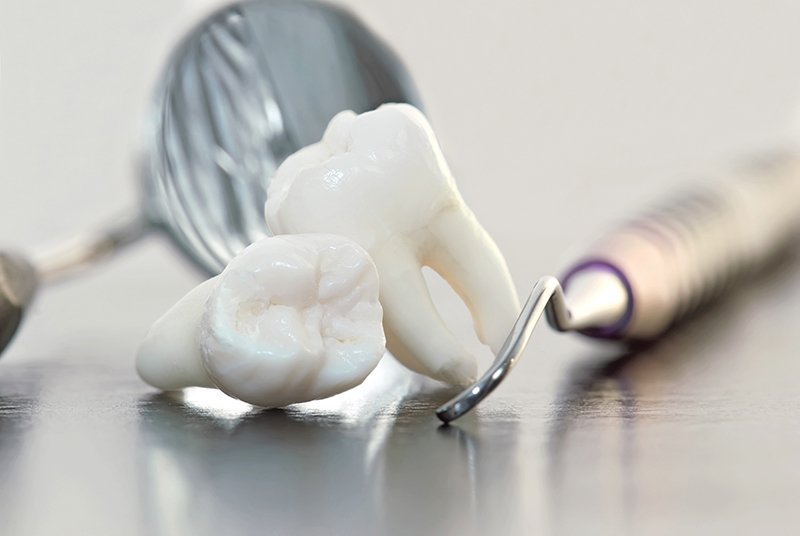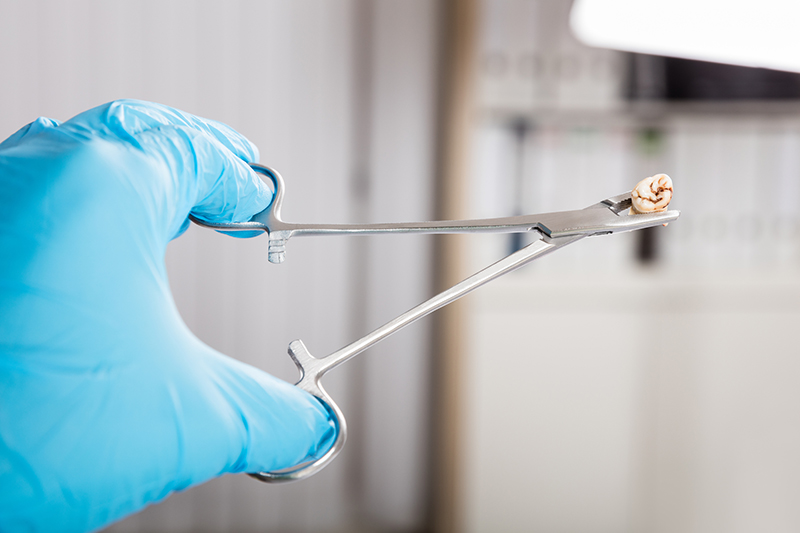
Extractions
Teeth that are severely damaged by decay or injury and cannot be salvaged will need to be extracted and replaced by a prosthetic tooth of some sort.
If you have exhausted all efforts to save the tooth or your dentist tells you that there is no appropriate treatment for your case, it’s important to have the tooth removed and replaced as soon as possible. Dr. King offers same-day extractions to streamline the treatment process.
There are different types of tooth extractions, and Dr. King can advise you which approach is indicated after evaluating your case.
If extraction has been recommended in your case, call our office to schedule your appointment. We can help you get started on restoring a complete and healthy smile by removing any damaged teeth you may have.
Why does a tooth need to be extracted?
Trauma that results in broken teeth, or large areas of decay that cover a significant portion of a tooth, can create the need for extraction. In such cases, the damaged teeth will need to be extracted if treatments like root canal therapy fail in their efforts to preserve the teeth.
While extraction is generally a last resort, it may be the only available option to protect your oral health. For example, if a tooth is affected by a large cavity, that decay could spread to surrounding teeth and compromise them. So, the initially affected tooth may need to be sacrificed to save its neighbors.
How long do I have to wait to get a tooth extraction?
Dr. King offers same-day extractions in many cases. If patients are healthy enough and no uncontrolled oral diseases are present, they can have the tooth extracted at the initial appointment. This is appealing to patients who want to streamline the treatment process.
In cases when same-day extraction would not be appropriate, Dr. King may recommend other treatments, such as periodontal interventions, to address any issues that need to be resolved before extraction can be completed. Patients may be referred to other providers for these treatments.

Types Of Tooth Extractions

There are two types of extractions: surgical and non-surgical.
• Surgical extractions are needed when certain issues prevent a simpler extraction. For example, teeth that are impacted, or surrounded by bone, must be removed in a surgical procedure. Dr. King will need to excise the surrounding bone to access the tooth and extract it.
• Non-surgical extractions do not have any complicating factors and do not require special techniques.
Planning To Replace Extracted Teeth
Having teeth extracted leaves an unsightly space in your smile, and patients usually will want to fill in that space with a prosthetic tooth. It’s important to note that impacted wisdom teeth are typically not replaced because they have minimal impact on the smile’s appearance and functioning.
For extracted teeth that will be replaced, it is helpful to begin the tooth replacement treatment planning process as early as possible. Dr. King can help with this aspect of your care as well.
Structurally complete dental implants are often recommended due to their many advantages over standard tooth replacement appliances, such as fixed dental bridges. Dr. King can advise you about dental implant placement and whether it may be right for you.
Common Questions about Tooth Extraction
Does tooth extraction hurt?
Dr. King will apply a local anesthetic before both surgical and non-surgical extraction. IV sedation may also be used for additional comfort during surgical extraction. While the anesthetics are still in effect, the patient will not experience any discomfort. However, after the anesthetics wear off, patients may experience some discomfort for the first day or two. This discomfort typically can be managed with over-the-counter painkillers. If you have severe or persistent pain after extraction, contact our office for further evaluation.
What is the cost of a tooth extraction?
The cost of tooth extraction reflects various factors, such as the type of extraction (surgical vs. non-surgical), anesthesia/sedation, imaging, and other associated services. Dental insurance may cover some of these expenses, and our staff will help you work out a payment plan that fits into your budget.
What is the healing time of a tooth extraction?
Patients can expect most healing to occur within a week or two of the initial extraction, barring any post-extraction complications. Keep in mind that it takes longer to heal after a surgical extraction than a non-surgical one. Regardless of the type of extraction you have, it’s essential to follow Dr. King’s instructions for aftercare to prevent issues such as dry sockets or infections from developing.
Does a tooth extraction cause bleeding?
Patients may experience some minor bleeding following a tooth extraction. Dr. King will advise you of strategies to address it, such as placing sterile gauze at the site, in your post-extraction instructions. Ongoing bleeding or a large volume of bleeding may indicate a problem and warrants follow-up with our office.
